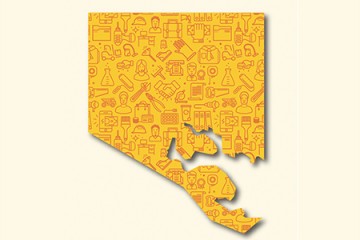HopkinsLocal is an initiative launched in September by Johns Hopkins to leverage its role as an anchor institution and create lasting economic opportunities in Baltimore. Through HopkinsLocal, the university and health system are expanding their outreach to local businesses and residents, including women and minorities, when they build, hire, and buy. Here, we sit down with HopkinsLocal's Affan Sheikh, associate for strategic initiatives, to discuss what employees should know about the new endeavor.
Tell us how HopkinsLocal came to be.
This intentional effort to strengthen the bonds between Johns Hopkins and Baltimore has been one of President [Ronald J.] Daniels' major priorities since coming to Hopkins. In his installation address, which I attended as an undergraduate, I clearly remember him saying "Johns Hopkins is not only at Baltimore or in Baltimore, but we are truly and proudly of Baltimore." That idea is a major element of the president's Ten by Twenty vision, and it is at the core of HopkinsLocal.
HopkinsLocal was developed by a working group of senior administrative leaders and faculty from the university that was charged with determining exactly how Johns Hopkins could leverage its buying and hiring power to further support Baltimore City. Over time, the group expanded to include senior administrators from Johns Hopkins Health System, and it worked for many months to create a joint effort with even broader reach.
What does the word local mean for this initiative?
For hiring, this program has a hyperlocal focus that aims to affect the communities that include our campuses in Baltimore as well as the most distressed communities in the city. Hiring activities include our direct hiring efforts for positions at the university and health system, new jobs as a result of construction projects, and job opportunities through our major vendors.
For purchasing goods and services, we are focusing on vendors in all parts of the city, particularly minority- and women-owned businesses. Eventually, our design and construction teams will also set requirements for participation by companies in Baltimore City on construction projects.
What should Johns Hopkins employees expect from HopkinsLocal?
The university and health system have spent significant time setting specific goals across all areas of HopkinsLocal. These goals demonstrate Hopkins' serious commitment to building, hiring, and buying locally and have been endorsed by leadership both internally and publicly. In order to achieve our goals, we have made it as easy as possible for faculty, staff, and students to support HopkinsLocal by providing resources like the vendor guide that includes a list of diverse and local vendors.
Investments in an economic inclusion recruiter and career coaches will also support the recruitment and retention of employees, as well as our managers and supervisors. Finally, our design and construction teams, through a Vendor Review Committee, will maintain a list of prequalified vendors for construction projects. We look forward to meeting our goals with the participation of every member of the Johns Hopkins community, which, in turn, will lead to a stronger and more vibrant Baltimore.
For city residents and businesses, what new opportunities may arise through HopkinsLocal?
The new policies and procedures developed under HopkinsLocal aim to strengthen the pipeline for local vendors seeking contracts. One example is the establishment of monthly local vendor days, when the procurement teams can get to know local firms and identify those that can supply high-quality goods and services at a competitive price.
We have also created a single point of entry to Hopkins for vendors interested in doing business with the institution. Construction-related vendors can fill out a vendor prequalification form that will be reviewed by a Vendor Review Committee, while vendors providing other goods and services can email buylocal@jhu.edu for the opportunity to participate in a local vendor day.
At the same time, the Human Resources departments will be exploring partnerships and training programs that can help city residents prepare to apply for and succeed in jobs at the university and health system. Recruiters will be seeking qualified local candidates for positions at all levels.
In addition to direct contracting or employment, we are working with our existing vendors to ask them to hire local residents and buy goods and services from local vendors. We also hope our peer educational and medical institutions, and other major employers in the city, will join us to further our collective investment in Baltimore.
What sets HopkinsLocal apart from similar initiatives at other universities?
First, our construction projects will have requirements for MBE (Minority Business Enterprise) and, eventually, LBE (Local Business Enterprise) participation written into contracts with companies doing the work. A liquidated damages clause in each contract will ensure accountability if the requirements are not met.
We have also been creative with the broader influence of our procurement spending. We know there are certain goods and services that will need to come from vendors that are not based in Baltimore. We plan to use the proposal process to find vendors that support HopkinsLocal's goals. For them, this may include hiring local residents, sourcing local goods or services, or opening an office or warehouse in the city. Those efforts will be included in the contract, monitored, and used as a factor in determining future business.
Posted in Community









